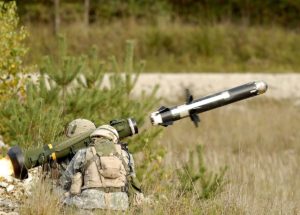The House’s version of the next defense policy bill includes a provision for a new fund of up to $500 million per year dedicated to Pentagon efforts for establishing a strategic reserve of “high-demand munitions” for potential weapons transfer in support of Ukraine.
The establishment of the ‘‘Ukraine Critical Munitions Acquisition Fund’’ was included as an amendment adopted to the House’s Fiscal Year 2023 National Defense Authorization Act (NDAA) last week, along with several other measures related to the ongoing conflict in Ukraine.

Reps. Adam Smith (D-Wash.) and Mike Rogers (R-Ala.), leaders of the House Armed Services Committee, offered the provision which would set up a revolving fund in the U.S. Treasury “to procure high-demand munitions in advance of the transfer of such munitions to eligible foreign countries in anticipation of supporting sustained contingency operations in Ukraine.”
The $40 billion Ukraine aid supplemental Congress previously passed included a munitions acquisition fund which Secretary of Defense Lloyd Austin said would help procure “vital munitions, like anti-aircraft and anti-tank munitions to surge for this crisis and, quite frankly, crises to come” (Defense Daily, April 28).
The critical munitions fund included in the House’s NDAA is authorized to run through the end of 2024 and would be available for the Pentagon to ensure adequate weapons stocks are available for allies and partners and would also “finance the acquisition of critical munitions in advance of the transfer of such munitions to foreign countries during the war in Ukraine.”
“Subject to the availability of appropriations, the [Defense] Secretary may also use amounts made available to the fund to keep on continuous order munitions that the secretary deems as critical due to a reduction in current stocks as a result of the drawdown of stocks provided to the government of Ukraine for transfer to Ukraine or with the concurrence of the Secretary of State, to procure munitions identified as having a high use rate during the war in Ukraine,” the lawmakers write in the amendment.
William LaPlante, the Pentagon’s top acquisition official, has said the department’s intent is to eventually replenish stockpiles of equipment, such as Javelin and Stinger missiles, sent to Ukraine on a “one-to-one” basis, while noting that will likely require several funding efforts before production lines can reach that capacity (Defense Daily, May 6).
The House’s NDAA already included provisions for regular briefings from the Pentagon updating Congress on progress replenishing stockpiles of critical munitions provided to Ukraine and efforts to sustain production capacity moving forward (Defense Daily, June 17).
A separate NDAA amendment from Rep. Cori Bush (D-Mo.) requires a study on the amount of funding provided to defense contractors for efforts related to procuring replacement stocks for munitions sent to Ukraine.
Rep. Pramila Jayapal (D-Wash.) also had an amendment adopted to the NDAA that directs the Pentagon to provide a report on the distribution of U.S. weapons provided to Ukraine, “including compliance with relevant laws and its efforts to prevent such arms from being sold on the black market or obtained by extremist groups.”
The House voted 329 to 101 last Thursday evening to pass its nearly $840 billion version of the FY ‘23 NDAA (Defense Daily, July 15)